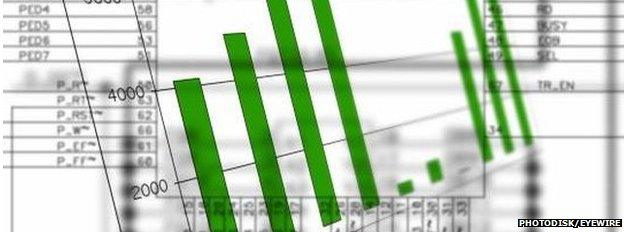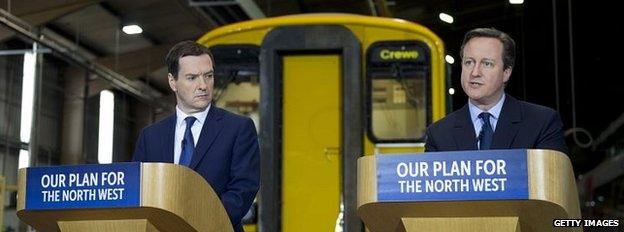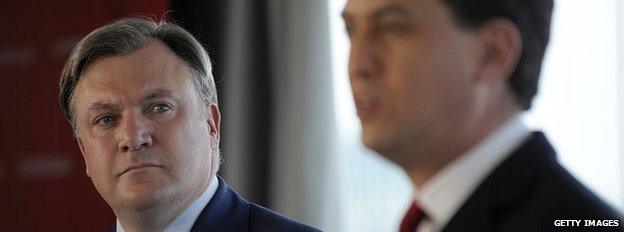Election - Forget the stats, focus on the big choice
- Published

Forget the dizzying list of stats - the millions, billions and percentages - for just a moment.
Forget those clever folk at the Institute for Fiscal Studies.
Forget the claims and counter-claims that "we've spelt out our plans" and the "it's the other lot whose 'numbers simply don't add up'".
Focus instead on what has been missing from this election campaign so far. That is the scale of the choice the electorate are facing. A choice that has been masked by deliberate evasiveness and obfuscation on all sides, by vague ambitions dressed up to sound hard and specific and, above all, by the political cross-dressing of the two big parties.
First Labour tried to convince voters that the deficit, which Ed Miliband had forgotten to mention in his Party Conference speech, was in truth the first thing on his mind at all times.
Then the Conservatives, who have endlessly warned about the risks of unfunded tax and spending promises, splashed the cash on pledges to fund the NHS, an inheritance tax cut, more childcare places and more besides.
So, what is the reality of the choice between the big parties? What the IFS spelt out today is what you'd pretty much expect.
The Tories plan to cut public spending substantially more than Labour and, say the IFS, would as a result have to make substantial cuts or tax rises neither of which they've spelt out.
On the other hand, the institute concluded, the country would be rewarded with lower debt - around £90bn at today's prices - lower debt interest payments and greater protection from future crises.
'Somewhere in the middle'
The IFS say Labour could make "only relatively small cuts" but they criticise the party for being unspecific about how quickly they want to cut the deficit and, therefore, spending too. The language has been significantly toughened during the election but their policies have not.
They allow Ed Balls to choose between making some pretty eye watering cuts or not many at all. I think you can assume that he and Ed Miliband would prefer, if at all possible, to deliver the latter.
The Lib Dems are - and, again, there's no surprise here - somewhere in the middle. Tighter on borrowing and spending than Labour but not as tight as the Tories.
So far so simple. So far so unsurprising. So far, though, a pretty big choice for voters who often complain that all parties are the same.
For those with the appetite for a little more detail…
How big would Tory spending cuts be?

If they could cut welfare as much as they promise - and they've not told us how they'd do that - and if they could cut tax avoidance on the scale they want - a promise all parties have made and none can be sure of delivering - what would that mean for spending in so-called unprotected areas ie not the NHS, schools and international aid?
These would need to be cut at a "slightly slower rate of cuts than over the previous parliament" taking departmental spending "to its lowest level in real terms since 2003-04" says the IFS. The Tories will delight in pointing out that this is hardly the 1930s let alone the road to Wigan Pier. They will say they've done it before with less fuss than most people expected so they should be trusted to do it again.
And yet and yet. The "age of austerity" would see total cuts to 'unprotected' areas including defence, transport, law and order and social care of around a third of their budgets. These are huge sums with unspecified consequences.
What's more the big ticket savings the Tories pushed in this parliament have either been done and can't be done again - e.g. raising the age of retirement - or will be hard to repeat- such as public sector pay restraint and increasing benefits less than the rate of inflation.
If they can't get the welfare or tax avoidance savings they want or if the economy slows and tax revenues decrease all this could get harder to deliver.
What about Labour?

If they interpret their policy loosely they'll easily be able to find the extra cash for the NHS they've so far steadfastly refused to promise as much as NHS England say is needed - and some of the other things they are sure to be lobbied hard for. Why don't they make those promises now? Well, they assume that voters will assume that Labour would love to spend more which is why they're trying so hard to sound "prudent" - to use Gordon Brown's favourite word.
Ed Miliband and Ed Balls believe that the right spending policies can increase the rate of economic growth, which is a better and painless way to cut the deficit. However, if they're wrong then the deficit and debt will stay higher for longer. If external events - another Eurozone crisis - came along then they, just like the Tories, would find their optimistic projections having to be torn up.
So, in conclusion: There's an awful lot the parties are not telling us which people like me should continue to demand they do. Don't hold your breath for answers but don't despair.
Push aside the rhetoric and the evasions and the cross-dressing and the differences aren't hard to see.
What seems to be proving harder for the larger than usual number of undecided voters is deciding which to choose.
No institute can tell you the answer. No number cruncher. No statistic. You have to make a judgement based on whose values you share and who you trust. Good luck with that.
- Published23 April 2015
